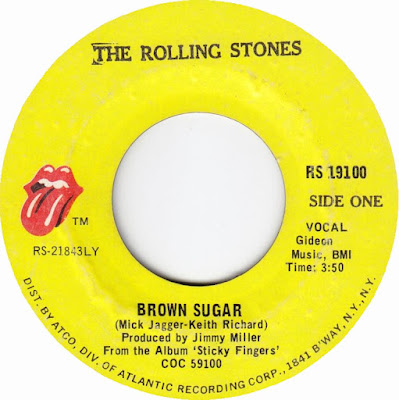Rolling Stones – "Brown Sugar" (1971)
Posted by admin on
Scarred old slaver knows he’s doing alright
Hear him whip the women
Just around midnight
[NOTE: I announced recently that the records that will be featured on 2 or 3 lines in the upcoming year will be taken from a 474-item list of unfamiliar but blog-worthy records whose titles I’ve jotted down after hearing them on Sirius/XM radio. “Brown Sugar” is not on that list, so it looks like that plan lasted exactly three posts. But as I’ve said before, “My blog, my rules.” (If you don’t like it, you can always cancel your free subscription.)]
* * * * *
The lyrics to “Brown Sugar” have been called “gross,” “sexist,” “stunningly crude,”
and “stunningly offensive,” among other things.
Well, those critics don’t have the Rolling Stones’ second-most-performed song to kick around any more. Since releasing “Brown Sugar” on the Sticky Fingers album 50 years ago, the “World’s Greatest Rock ’n’ Roll Band” has played the song live some 1136 times. Mick and Keith and the boys have performed only one song – “Jumpin’ Jack Flash” – more often.
But it’s apparently no mas for “Brown Sugar” – at least temporarily. Keith Richards recently confirmed that the song has been dropped from the setlist for the Stones’ current American tour. “You picked up on that, huh?” the 77-year-old wonder told a Los Angeles Times reporter when asked if the Stones had cut the song.
 |
His subsequent comments to that reporter seemed to acknowledge that “Brown Sugar” was a victim of the current climate of heightened cultural sensitivity:
I’m trying to figure out with the sisters quite where the beef is. Didn’t they understand this was a song about the horrors of slavery? But they’re trying to bury it. At the moment I don’t want to get into conflicts with all of this sh*t. But I’m hoping that we’ll be able to resurrect the babe in her glory somewhere along the track.
* * * * *
Mick Jagger – a man who always keeps his cards close to his chest – offered a somewhat different explanation. “We’ve played ‘Brown Sugar’ every night since 1970, so sometimes you think, ‘We’ll take that one out for now and see how it goes,’ he told the Times, adding “We might put it back in.”
Jagger admitted in 1995 – long before today’s “cancel culture” movement existed – that the song was problematic: “God knows what I’m on about in that song. It’s such a mishmash. All the nasty subjects in one go.”
“I would probably censor myself [today],” he added. “I’d think, ‘Oh God, I can’t. I’ve got to stop. I can’t just write raw like that.’”
Jagger did, in fact, censor himself when he wrote the song. Originally, the song was going to be titled “Black P*ssy.” But he realized that was too much even by 1971’s much more loosey-goosey standards.
* * * * *
The first two verses to “Brown Sugar” talk about slavery and the mistreatment of slaves. It would be quite a stretch to condemn them as somehow condoning that mistreatment – it’s more reasonable to read those verses as condemning the very bad behavior of the past.
So what’s the beef with the song?
One problem seems to be the juxtaposition of those verses with a chorus – “Brown sugar, how come you taste so good?” – in which Jagger celebrates sex with black women. (Presumably Mick’s carnal encounters with black women were completely consensual, while the sexual exploitation of female slaves by slave traders and owners was anything but.)
 |
| Ronnie, Mick, and Keith |
I suspect the bigger problem is that the music that accompanies its questionable lyrics is so damn exhilarating. There’s no Stones song that’s more musically euphoric than “Brown Sugar” – and given the subject of the lyrics, that seems very wrong to a lot of people.
Pair up the words of “Brown Sugar” with more somber music – something closer to “Paint It, Black,” perhaps – and it might be a very different story.
* * * * *
I don’t think that much about the meaning of a song’s lyrics when I’m listening to it – and singing along with it, which is usually the case.
That’s partly because I don’t pick up on a lot of the words in a song. I doubt that I could write down the lyrics of a single rock song – even those that I’ve been listening to since the sixties – without getting some of the words wrong. Of course, my accuracy would go way up if I could listen to the song while I was jotting down the lyrics – but even then I would get things wrong.
Take the lyrics to today’s featured song that are quoted at the beginning of this post. I always thought that Mick was singing “Hear him WITH the women,” not “Hear him WHIP the women.”
* * * * *
I’m not sure what is accomplished by the Stones’ not performing “Brown Sugar” any more. There are certainly many songs that advocate socially unacceptable behavior – think of all the gangsta rap songs that celebrate violent actions against law enforcement and are misogynistic in the extreme – but it’s insane to view “Brown Sugar” as pro-slavery or pro-rape.
 |
And if “Brown Sugar” is deleted from the Stones’ setlist. what about “Stupid Girl,” and “Some Girls,” and “Under My Thumb” (to name just a few Stones song that are not exactly paragons of wokeness)? Do we treat them like the musical equivalents of Robert E. Lee statues and consign all of them to Trotsky’s “dustbin of history” – never to be played in concert or on the radio again?
* * * * *
I could go on and on about my belief that we need to stop applying today’s moral standards to people and works of art from the distant past – after all, a hundred years from now, people are going to be laughing their asses off at our hypocrisy and utter cluelessness – but I suddenly got very tired of this whole topic.
If the Stones wants to keep playing “Brown Sugar,” that’s just fine with me. But if they want to drop it rather than be faced with a constant stream of criticism from holier-than-thou cultural provocateurs who have nothing better to do, you can hardly blame them. Life is far too short – especially at their advanced ages – to deal with such nonsense.
* * * * *
Now that I think about it, isn’t the “Brown Sugar” tempest in a teapot really just the mirror image of what happened after John Lennon said the Beatles were more popular than Jesus? (In case you’ve forgotten or weren’t around in 1966, what happened then is that a number of American radio stations – including the only top-40 station in my hometown of Joplin, Missouri – stopped playing Beatles records.)
If you boycotted the Beatles because you thought Lennon’s comment was blasphemous, or if you think “Brown Sugar” is misogynistic and racist, knock yourself out. After all, it’s a free country. (Sort of.)
* * * * *
The late Charlie Watts’s playing on “Brown Sugar” is a good illustration of his philosophy that less is often more when it comes to being a drummer in a rock ’n’ roll band.
 |
| The late Charlie Watts |
“I was brought up on the theory that the drummer is an accompanist,” Watts told an interviewer in 2008. “I don’t like drum solos. I admire some people that do them, but generally I prefer drummers playing with the band. The challenge with rock and roll is the regularity of it. My thing is to make it a dance sound. It should swing and bounce.”
Watts used a very simple drum kit – a bass drum, one floor tom, one mounted tom, and a snare drum. By contrast, Keith Moon started with a similar kit but ended up with a setup that included two bass drums, two floor toms, nine mounted toms, and a snare drum – not to mention timbales, one timpani, and a gong.
Click here to hear “Brown Sugar” – assuming that you’re man (or woman) enough to handle it.
Click on the link below to buy the song from Amazon:
